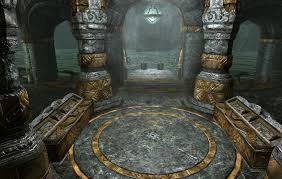chamber
英 [ˈtʃeɪm.bər]
美 [ˈtʃeɪm.bɚ]
- n. (身体或器官内的)室,膛;房间;会所
- adj. 室内的;私人的,秘密的
- vt. 把…关在室内;装填(弹药等)
- n. (Chamber)人名;(英)钱伯
使用频率:

记忆方法
将“chamber”与“cham”结合记忆,想象一个有房间的“cham”(可以联想到教堂或私人房间),这种结构暗示了“chamber”是一个房间或室的意思。
以上内容由AI生成, 仅供参考和借鉴
中文词源
chamber 室,会议厅
来自PIE*sker, 转,拱。词源同camera, comrade, curve. 原指拱形的室,现已无限制。
英语词源
- chamber
-
chamber: [13] The ultimate source of chamber is Greek kamárā ‘something with an arched cover, room with a vaulted roof’. This passed into Latin as camara or camera (source of English camera), and in Old French became transformed into chambre, the immediate source of the English word. Related forms in English include comrade (from Spanish camarada), originally ‘someone sharing a room’; chamberlain [13], which was originally coined in the West Germanic language of the Franks as *kamerling using the diminutive suffix -ling, and came into English via Old French chamberlenc; and chimney.
=> camera, chamberlain, chimney - chamber (n.)
- c. 1200, "room," usually a private one, from Old French chambre "room, chamber, apartment," also used in combinations to form words for "latrine, privy" (11c.), from Late Latin camera "a chamber, room" (see camera). In anatomy from late 14c.; of machinery from 1769. Gunnery sense is from 1620s. Meaning "legislative body" is from c. 1400. Chamber music (1789) was that meant to be performed in private rooms instead of public halls.
- chamber (v.)
- late 14c., "to restrain," also "to furnish with a chamber" (inplied in chambered, from chamber (n.). Related: Chambering.
权威例句
- 1. More than 80 parties are contesting seats in the two-chamber parliament.
- 有80多个党派在竞争两院的议席。
- 2. She could hear the tinny strains of a chamber orchestra.
- 她能听见室内管弦乐队尖细的旋律。
- 3. He thought he saw someone lurking above the chamber during the address.
- 他觉得自己看见有人在演讲时潜藏在会议厅顶上。
- 4. Her instructor plugged live bullets into the gun's chamber.
- 她的教练在枪膛里装上了实弹。
- 5. The members left the council chamber.
- 议员离开了会议厅。